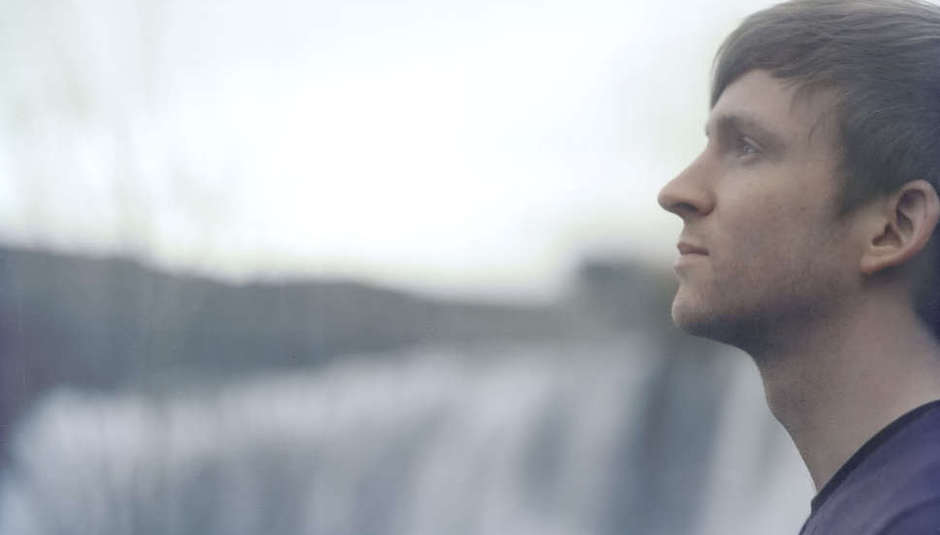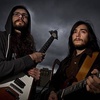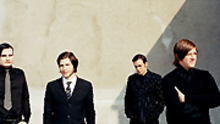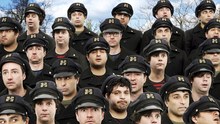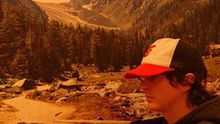Listening to Icelandic neo-classical composer Ólafur Arnalds's current album ...and they have escaped the weight of darkness..., it's hard to imagine that this is a man whose previous predominant musical experiences were centred around drumming in a hardcore band named Fighting Shit - a band he claims were "heavier than Metallica".
Although his path to his current standing of revered, arguably prodigious, musician is less than conventional, it feels nothing if not natural. The new album draws on themes similar to the first record, Eulogy For Evolution, which was centred around the circular nature of life. This one takes the form of the circular nature of light.
We caught up with a very busy Ólafur to discuss the themes surrounding his music, what it was like to play in China, the preparation for his (now past) Manchester show with the RNCM Symphony and whether he sees a change in direction in his musical future.
DiS: Hey Óli, how's it going?
Ólafur Arnalds: It's going OK, but it's just been a really busy day! I'm leaving tomorrow for Manchester and I'm trying to finish this film score which I suddenly got a deadline for! They didn't bother to tell me earlier that the deadline was while I'm in Manchester, so I have to finish that before I leave, which is not humanly possible! I have about five days of work left and one day to do it...
Oh dear! Going to be a late one then?!
ÓA: Actually at the moment I'm just trying to do something, because they have a preview of the movie and then I'll fix it for the next preview...
DiS: What's the film?
ÓA: It's called Blinky TM and is by Ruairi Robinson. It's a short film. He got an Oscar nomination for his last one which was called Sweet Dreams, I think...
DiS: Have you done much film score work before then?
ÓA: No, this is the first. I've done a lot of advertisments and stuff like that and I've had some syncs - songs that weren't released have been used in movies, but this is the first proper full film score I've done.
DiS: Had you been enjoying it up until the deadline was thrust upon you?!
ÓA: Yeah, I was. I'm not any more!
DiS: Onto your past now...your progression to playing and composing the sort of music you do hasn't been the most traditional one, how did it all come about?
ÓA: It just slowly grew on me I think. When I was 14 or 15 I started making music on my piano - programming strings on my computer using crappy MIDI instruments. It sounded really bad, and then I put it on some Icelandic site...I'm still getting messages about it ten years later! It really hit a weak spot for a lot of people. But even then, when I was 14, I started getting these e-mails from huge producers...Grammy award winning ones. That project didn't really go anywhere, but that's different to what I do now. That was more a prog-rock kind of thing, just with piano and strings. Then one day when O was playing in hardcore bands I gave a demo to the guitar player in the biggest German metalcore band called Heaven Shall Burn, as my band were supporting them on tour. I gave him the demo of it and after the tour he e-mailed me and asked if I was willing to write something like it for the intro and outro for their album so I said “yeah, sure”. But when I was doing that I couldn't do the same as they do...I had to take all the rock out of it because they were already doing that, so I left the piano and strings in. That's kind of how this came to be. After that their album got released and I got offered my first record contract...I wasn't even considering releasing an album of this sort of stuff, I just did it because they asked me to do it...I was then asked if I was willing to do an album, and that was the first record!
DiS: Do you remember what your first show was like?
ÓA: Yeah, it was terrible! Before the album came out I did a show in my old home town, the town where the old Sigur Ros studio is, called Mosfellsbær. And every year they have this cultural day and I played in the museum there. I found some kids to play the strings who were still in school and weren't very good - it was all out of tune. It was just not thought out, you know? I went there and we played. It was not great but for the next show I actually decided to think things out a little bit more and create the sounds and do a little bit more rehearsing!
DiS: What are your methods for composing – do you just sit down and write? Do you use any software like Sibelius?
ÓA: I always just sit down and write on the piano, because the basic idea for a song comes from that, the melody or whatever. I use ProTools and then I programme the strings in there...I sometimes use Sibelius to arrange but after using ProTools I always take it into Sibelius to fix it up and notate it properly. It's nice to mix it up. If you use the same method all the time it's hard to get different results.
DiS: How long a period was the new record written over? It all sounds quite cohesive.
ÓA: It was actually written over quite a long time. A lot of the ideas for songs were written over tour, during soundchecks and when Terry, my engineer, asked me to play the piano so he could fix the sound, I would usually just improvise instead of playing the same old songs over again and most of the album's ideas came through those improvisations. Then when I got home from each tour I'd go into the studio and make something out of these ideas. The oldest song is actually from before the first album was released! And the newest song was written in the studio during the piano recordings for the new album, so it's a very broad spectrum of myself.
DiS: Do you think that coming up with all the ideas informed how the record sounds, like being on the road?
ÓA: Definitely, yeah. I think that...not necessarily for better or worse but it changes it. I don't know how it would have sounded if I'd have just gone into the studio and decided to start writing an album there and then, but it wouldn't have been the same. It might have been better, it might have been worse, I don't know.
DiS: Do the individual songs remind you of the places you played when you came up with the ideas then?
ÓA: Yeah, mostly because the working titles from the songs were the names of the cities or the name of the venue. We still call all our songs by the working titles, so that's just what we're used to. Like we'll say “play Braunschweig” and that'll remind me of the show I played in Braunschweig in Germany. So, yes, definitely.
How different was the process for your new album, given that you were much more of a novice to it all when you recorded Eulogy for Evolution?
ÓA: This one I knew much more what I was doing – even though the songs were written much more over a longer period of time, I already had the idea for the album by the time I'd written that first song ['Undan Hulu'] back in 2007. I already knew then what I wanted the album to sound like and be like, as opposed to the first album where I didn't know anything what I was doing, it was just a collection of songs which I tried to put together, if that makes any sense.
DiS: Do you feel happier with this one because of it? The listener doesn't always know how you wrote or recorded the album, it's just the end product which they hear...
ÓA: Yeah, I'm very happy with it. And I think it doesn't sound like it was written over a long period of time, it sounds like someone who knew at the beginning what they wanted to achieve, so I'm very happy with that.
DiS: I agree, it all sounds like it's been written in one sitting, with clear themes...
ÓA: Some of the songs are written consciously to fit with the others. There are even references to other albums – I like to intercollate everything. There's even one song from the album which incorproates a melody from Found Songs...actually there's two of them! Even with the titles I reference that song in the title, so it's not like I was just writing blindly, I was already thinking about what I already had and what I needed to make that all fit again.
DiS: There are a lot of repeating themes and motifs on the album...that helps it fit as a complete piece and in total...
ÓA: You may notice, for example, that the first song and the seventh song start in exactly the same way and begin with the same ambient sound in the background and with the same chord progression. But that's all conscious, that's to do with my concept of how I want to build up the album...it goes quite sad and then by track seven it goes happy again, so I thought it would be like a new beginning, so I'd reference the beginning of the album so we could call it a new beginning where everything is a little bit better and positive. There's a lot of hidden stuff like that, though. I think that if people listen to the album enough times they will start noticing these things.
DiS: Where did the idea for ...and they have escaped the weight of darkness... come from? I understand the line is taken from a film?
ÓA: The theme is actually quite similar to the first album, just a different aspect of it. It's basically what the title says, that there's always light after darkness, that the sun always comes back. So that circle of life always keeps going. It's personal for me as well, the reason why I chose that. Like most people, I go up and down as well so, it was a realisation for me at one point where I stopped worrying and everything will always be OK again. And then I saw that scene from the movie while I was looking for the title...I don't want to tell people too much, I'd rather they look for metaphors discretely but there is a theme there and people don't need to understand it - they can make up their own theme. I was looking for something I could use as a metaphor so when I saw this film where they were describing the solar eclipse and how everyone was so sad and miserable when the sun wasn't there and then when it came back everyone was happy again. They escaped the weight of darkness. I also use a solar eclipse on the cover and the titles are referencing that dialogue, too. There's a lot of references there.
DiS: It fits in quite nicely being Icelandic as well...
ÓA: Yeah, our winters are kind of like a solar eclipse!
DiS: Do you think that working and being from Iceland, the music isn't confined to the same pressures that artists in the UK and America would be – the instant desire for success? That artists are allowed to grow in their homeland, in isolation...
ÓA: I think so, definitely. Part of it is just that we need to do something when it's dark outside the whole time, there's more room for us to be creative and do something fun, like music.
DiS: You've said that you want to bridge the gap between different genres, do you find this gives you more freedom as a musician?
ÓA: No, I don't feel more freedom, but the freedom is on the side of the listener, if there are no lyrics it's easier for me to reach different cultures and different countries. For example, I recently toured Asia and the people over there said that I was someone who they really wanted to come - I was someone who could easily reach them, because I don't have lyrics, so there's no need for it. Obviously in China there's the problem that if a band is singing in English then most people ignore it because people don't speak English. But for me it's totally open to any genre, really and any kind of culture, so there is the freedom there in that aspect.
DiS: How was playing in Asia and specifically China? How did it come about?
ÓA: Actually I was supposed to go over there in 2008 – I had booked a few shows and festivals, and one of the festivals had paid for all of our flights – because that's the hardest part, being able to afford going over there. Then Björk came and said “free Tibet” at a concert, and after that all outdoor festivals were banned for a couple of years, so my festival was cancelled and we didn't have any flights so we couldn't go over there. It was quite disappointing, but at the time I stood up for Björk, thinking it was kind of cool that she did it. I totally randomly applied – there's this American company that runs this program connecting the Western world with the Eastern world and people can apply and they'll choose one of the bands and give them a tour of Asia. They'll book it, organise the flights and take care of all expenses. There were 800 applicants and they chose me! I'd even forgot about it when they called me up. It was great just to be able to get the opportunity to go over there without having to worry about the finances, to go and get a fanbase. They even paid for a PR campaign so I was in all the press. It went really well over there and I eventually worked with the people who organised the Björk concert who told me the real side of it. No-one heard what she said, it had no effect at all, it was just because of a YouTube video and someone said “is she saying Free Tibet?”. Obviously they got really nervous and said “I think she's saying 'Too bad'” or something. They almost convinced them. And then Björk wrote on her website saying “No, I'm saying free Tibet!”, and they all got arrested, the company who put on the concert got a huge fine, about 20 people lost their jobs and they couldn't put on a show for two years.
DiS: How did you find the reaction to it?
ÓA: Basically, even the people who agreed with her thought it was very rude. It's just a different culture and like I said, at first I stood up for her, and after speaking to all these people - by the way the promoters were Americans living in China, so they were not a part of Chinese culture in that way, but they understand it. After spending some time there you begin to understand it, but doing what she did doesn't help anyone, it doesn't help Tibet. It may have helped in the way that it got a lot of international press and it raised awareness about Tibet on that level, but in China, doing stuff like that has no effect, the only thing it does is put people in a lot of trouble. Seriously, it ruined people's lives. People lost their jobs and got such huge fines that they were in debt for many years to come.
DiS: Madness...
ÓA: I'm totally against the censorship thing, but if you want to start a revolution you have to start it from within – the revolution comes from the culture. It's always like that - the culture comes first and then things change. China was already starting to open up to help foreign culture into the country and with that it was already chaning, because the foreign culture affects the way people think within the country. What this did was to take that evolution that had been happening for a few years back to point zero because they closed the country completely again for foreign culture. So everything went backwards. I don't want to shit-talk Björk, she's great and one of my favourite musicians, but this wasn't very well thought out. Before you do stuff like that you need to try to understand the country's culture that you're in and whether this is the right thing to do or whether you'll make things worse by doing it.
DiS: How many shows did you play over there?
ÓA: We played six cities in China, Shanghai, Beijing, Qindao, Wuhan, Tianjin and a couple of others. I played both the major cities and what they call small towns, which I call huge fucking cities! Those are the funniest, they are cities of 7 million people where nothing happens. Like you'd speak about Slough or something, where nothing happens but it's true. If they have a concert there, it's like “woah!”. Nobody knows what to do with themselves...
DiS: So where the reactions very different there than to places like Beijing?
ÓA: Yeah. People in those towns had never seen anything like this before – and also just the way things work and the way we had to work our way around things. Technically, when it comes to sound, they're not very advanced. In one place it was so bad that I went to the promoter to ask if there was another sound company that could come and work the show, because the people who were there didn't know what they were doing! His reply was “I'm sorry, but this is the only sound guy in this town, it's just a small town!”. And this was a city of 7 million people...
DiS: How did you overcome that? Was it easy to solve?
ÓA: No! I actually know my way around a sound desk so I did it myself. I did my own soundcheck! I had to do it on a couple of shows over there. On every single show I had to at least do something, but this was the worst. I try to avoid this – I also just feel really rude. I don't want to be the person to tell them they're bad at their job, I don't like doing it.
DiS: It must've been fantastic all in all, though?
ÓA: Yeah, I think Taiwan was probably the best place we played. It was amazing, that show. They are much more open than normal...well, Western, people.
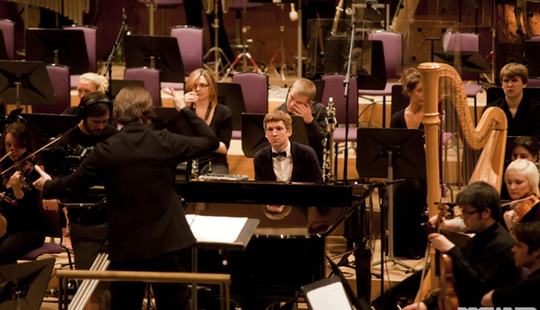 Olafur Arnalds plays Bridgewater Hall, Manchester. Photo: Paul Gregory
Olafur Arnalds plays Bridgewater Hall, Manchester. Photo: Paul GregoryDiS: If I could talk about the Manchester show – what have the preparations been for it?
ÓA: I had to rearrange everything for a full orchestra. On the album it's just written for piano and string quartet and also I tried to convert the electronics into symphonic instruments, to make it as orchestral as possible. In the end I kept a lot of the electronics in but yeah, there was quite a lot of work and a lot of the songs changed a lot. Some of them have a completely different feel to them.
DiS: Have you done anything on this scale before?
ÓA: No, this is the first time. It's the first time I've done anything for an orchestra.
DiS: You must be really looking forward to it?
ÓA: Yes. So far I've only heard the songs being played on my computer with horrible MIDI instruments, so most of all I'm looking forward to the first rehearsal just to be able to hear my songs how it's actually going to sound.
DiS: Do you think you'll do any more like this...I guess once you've done it it's easier from then...
ÓA: Once it's done it's done. We're already booking more shows for this...
DiS: Maybe one day you can do one in the new music hall in Reykjavik if the building ever gets finished...
ÓA: I'm actually in discussions about that! It's supposed to be ready next year. I've been speaking to the promoters and the directors of the Icelandic Symphony Orchestra about doing something there in October next year.
DiS: How have you found touring the UK – judging by your tour documentary from last year it seemed like it wasn't the greatest place to tour for you...
ÓA: I think it's true – most bands actually agree with this. When it comes to the music scene, there's a lot of great music, and I think this might be the problem, that because there's so much great music it's become less of a “thing”. It's not so incredible any more that there's all this good music out there, so when bands tour it's not really a big deal for anyone. It's hard to put your finger on it, it's hard to work out what makes the touring scene unappreciative. If you're touring in the UK you have to find your own place to stay, that's the deal, and then you pay a few quid and take care of yourself. In mainland Europe the venue would be the promoter and a proper promoter would take care of everything and make sure that there would be a great show happening that night. Not just a show, but a great show. Of course it's a toally different thing when you go to the bigger venues, which I'm experiencing now, when I go to places like Bridgewater Hall and Barbican Hall, it's totally fine. But that one tour I did was really hard. We would show up to places and there would be no-one there. They had not looked at any of our requirements – we usually tour in a bus and what the bus needs is parking and it needs power so we can sleep in it. Several places they hadn't thought of parking or power, so after the show we'd drive off to a rest stop on the highway and plug the electicity in there.
DiS: It's interesting that you say all this, because people over here – whether in bands or not – would just take those things as standard...
ÓA: Yeah, it's so normal. People on tour need to eat! Because the band doesn't have time to go anywhere and they wouldn't even know where to go. We need to soundcheck and then we need to play. There were several days on that tour when I wouldn't eat until after the show when we'd go to the rest stop because there wasn't any power at the venue.
DiS: It sounds like a complete nightmare...
ÓA: The first show after that was in Germany and I felt that was the most amazing show of my life. It was probably not even that great...
DiS: Where do they look after you the best then?
ÓA: Maybe in Germany and Belgium, these places are really good. They have a really professional music industry – or the live industry is very professional, even down to the smallest venues. You play a 150-200 capacity and everything is really well thought out and they make a schedule for the day and they don't play by ear, they decide everything beforehand so it runs smoothly. But it's one thing to be a favourite place to 'be' at and then another thing to play the concert itself. In those terms the UK isn't bad at all, I like playing for English people.
DiS: Have you played many festivals yet?
ÓA: Not in the UK, no.
DiS: I think it's something that'd be harder to translate onto a bigger stage...with sound so bad at festivals...?
ÓA: I've played quite a few festivals in Europe and usually it goes OK. Yeah, usually the sound is not very good but often you manage to catch people unexpectedly – people are there and they are just drinking, having fun. Sometimes when it goes well you manage to catch their attention and they end up being wowed, so I love festivals...
DiS: What are your plans for the summer? More writing?
ÓA: I've been working on this movie and orchestra arrangments. After I get back from the UK I'm producing a few tracks for the guy that co-produced my albums - just a few tracks for his new album. Then I'm actually going to take a vacation! I haven't done that in a long time. I need that, I need to chill out and tend to my friends and family because I'm usually in the studio 24/7. I sleep and work, basically.
ÓA: Has your family been very supportive and important to you?
ÓA: Definitely. They come to all my shows, they even came out to England when I played the Barbican Hall, just because it was an amazing venue and they wanted to see that, so my dad bought tickets for the whole family, like seven people to come and see me. Also when I did the ballet thing at Sadler's Wells with Wayne McGregor, they came out to that as well. They are very supportive and they really do a lot to show that support.
DiS: You seem like the sort of person that is always wanting to challenge themselves and try something new, do you think your career releasing records will always be in this style of music?
ÓA: Well I think if I want to do different things I'll do them under different names. Of course I want to evolve but as far as I see I want them to be classically inspired. Of course they could be different, but I want to keep bridging the gap that I am now. I could even do a dance album with strings, whatever, I'm open to anything in those terms. As long as I can inspire people, I can make some emotions happen in people's heads when it happens.
Ólafur Arnalds' current album, ...and they have escaped the weight of darkness... is out now via Erased Tapes. Click here to view the pictures from last week's Manchester show and here for the review of the album.

